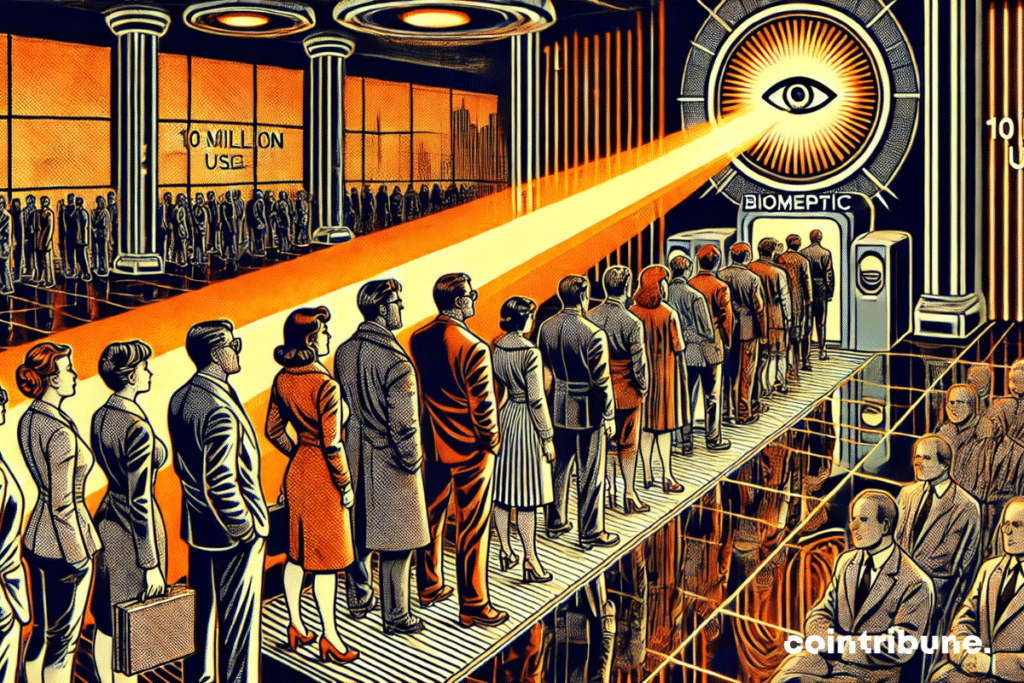10M Verified Users: Milestone or Privacy Risk for Worldcoin?
Artificial intelligence is progressing at a rapid pace, making the distinction between humans and machines increasingly difficult. In light of this evolution, Worldcoin, now rebranded as World, aims to establish a universal proof of humanity through a biometric identification system based on iris recognition. The company has announced that it has surpassed the milestone of 10 million verified users, a landmark that reflects its massive adoption and stirs growing controversy. Indeed, the project relies on a network of orbs designed to scan users’ ocular data to assign them an unforgeable digital identity. According to its creators, this technology would secure digital interactions and ensure that only real humans access online services. However, several governments and data protection authorities are concerned about the potential excesses of this model. Between technological promise and regulatory resistance, Worldcoin is part of a debate on digital identity and personal data governance. Its success or failure could shape the future of online authentication in a world where AI challenges the foundations of digital trust.

Worldcoin, a project in full expansion despite criticism
Worldcoin claims to have reached a new milestone in its expansion by surpassing 10 million verified users. In a statement released on January 9, 2025, the project team presents this figure as a decisive step towards secure and universal identification. According to its designers, the rapid rise of artificial intelligence threatens the reliability of online interactions, making it essential to establish a system capable of proving that a user is indeed a human. “As AI agents evolve, proof of humanity will likely become the cornerstone that enables ethical and scalable AI,” supports the company in its official post.
To achieve this goal, Worldcoin has established a network of biometric scanners called orbs, capable of analyzing users’ irises to assign them a unique and unforgeable World ID. Unlike traditional identification systems, this technology aims to provide decentralized proof of humanity without requiring administrative documents. Its creators assert that this method enhances privacy protection, as individuals’ identities do not rely on any centralized database. However, this model triggers significant concerns. Cybersecurity and data protection experts highlight the risks of mass surveillance and potential abuses associated with the large-scale collection of biometric data. As the project gains popularity, its global expansion is already facing significant regulatory hurdles.
Growing rejection by regulatory authorities
While Worldcoin highlights its success in adoption, regulatory opposition is multiplying around the world. As early as August 2023, Kenya was the first country to ban the project, citing risks to national security and data privacy. This decision marked the beginning of a wave of restrictions, fueled by growing concerns around the collection and storage of biometric data.
A few months later, in March 2024, Spain suspended Worldcoin for an initial period of three months before the company agreed to completely halt its activities in the territory until the end of the year. The Spanish Agency for Data Protection (AEPD) accuses the project of having illegally collected biometric data from minors and of having obstructed users’ right to withdraw their consent. This ban quickly inspired other European countries. In March 2024, Portugal imposed a 90-day suspension. The country emphasizes similar concerns related to the protection of citizens and the exploitation of sensitive data.
In May 2024, Hong Kong intensified pressure by banning Worldcoin on its territory, citing concerns related to privacy and the risk of mass surveillance. A few months later, in September 2024, South Korea imposed a fine of 1.1 billion wons (approximately 829,000 dollars) for violating personal data protection laws. In response to these sanctions, Worldcoin maintains that its operations strictly comply with local regulations. However, several regulators remain skeptical and denounce a lack of transparency in the management and security of the collected information.
The future of Worldcoin will largely depend on its ability to negotiate with authorities and demonstrate the compliance of its model with the requirements of regulatory bodies. Without a clear and globally accepted legal framework, its expansion could be slowed or even compromised.
The rise of Worldcoin illustrates the growing interest in digital identification solutions, but the repeated bans reveal major concerns about data privacy. For its supporters, ensuring proof of humanity is becoming essential at a time when artificial intelligence calls into question the authenticity of online interactions. Conversely, its detractors denounce potential abuses, notably the risk of mass surveillance and excessive centralization of digital identities. Faced with increasingly strict regulation, Worldcoin will need to demonstrate its compliance with data protection standards and establish a climate of trust with authorities and the public. Its future will depend on its ability to adapt to legal requirements while maintaining its ambition for a universal identification system. The outcome of this debate goes beyond Worldcoin. It could shape the future of digital identity and influence the regulatory framework of Web3 for years to come.
Maximize your Cointribune experience with our "Read to Earn" program! For every article you read, earn points and access exclusive rewards. Sign up now and start earning benefits.
Diplômé de Sciences Po Toulouse et titulaire d'une certification consultant blockchain délivrée par Alyra, j'ai rejoint l'aventure Cointribune en 2019. Convaincu du potentiel de la blockchain pour transformer de nombreux secteurs de l'économie, j'ai pris l'engagement de sensibiliser et d'informer le grand public sur cet écosystème en constante évolution. Mon objectif est de permettre à chacun de mieux comprendre la blockchain et de saisir les opportunités qu'elle offre. Je m'efforce chaque jour de fournir une analyse objective de l'actualité, de décrypter les tendances du marché, de relayer les dernières innovations technologiques et de mettre en perspective les enjeux économiques et sociétaux de cette révolution en marche.
The views, thoughts, and opinions expressed in this article belong solely to the author, and should not be taken as investment advice. Do your own research before taking any investment decisions.